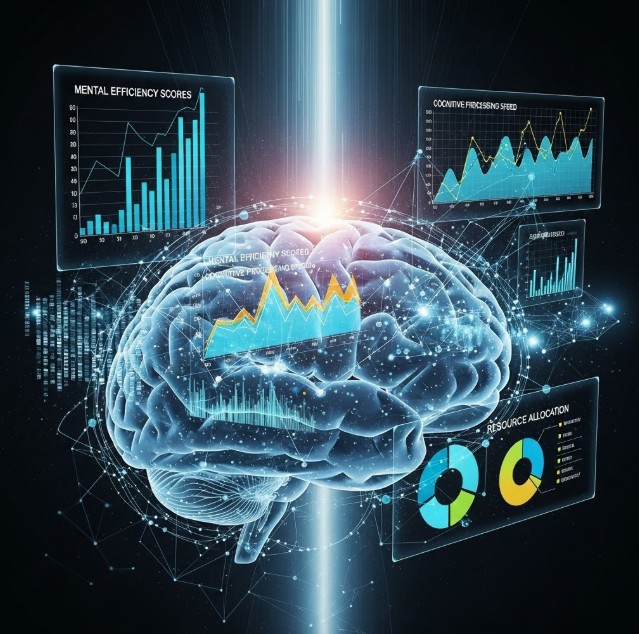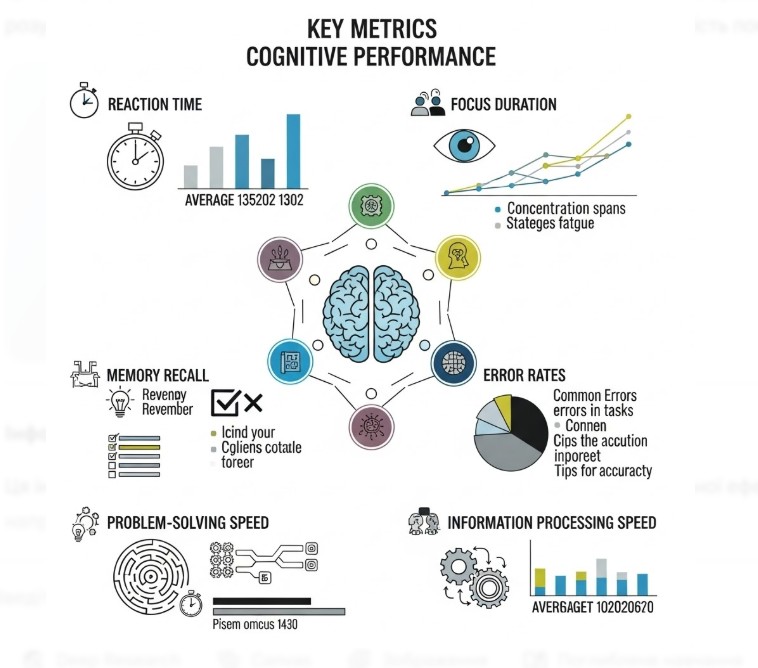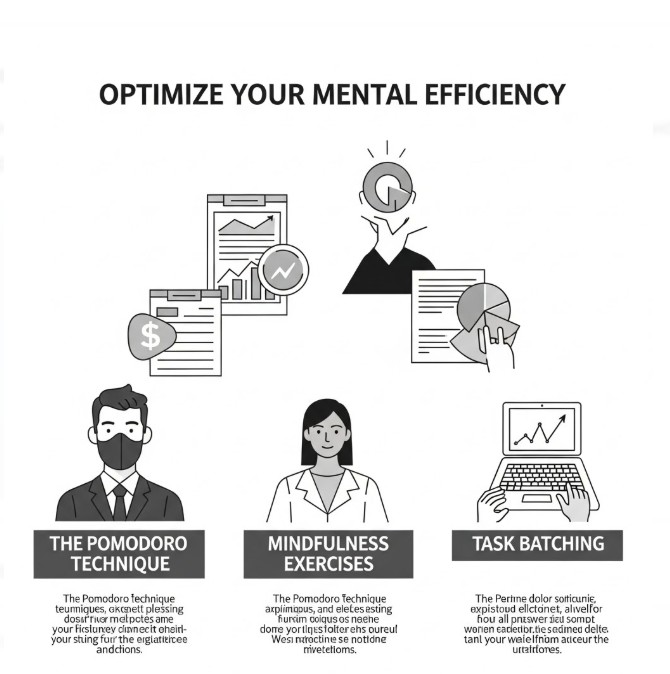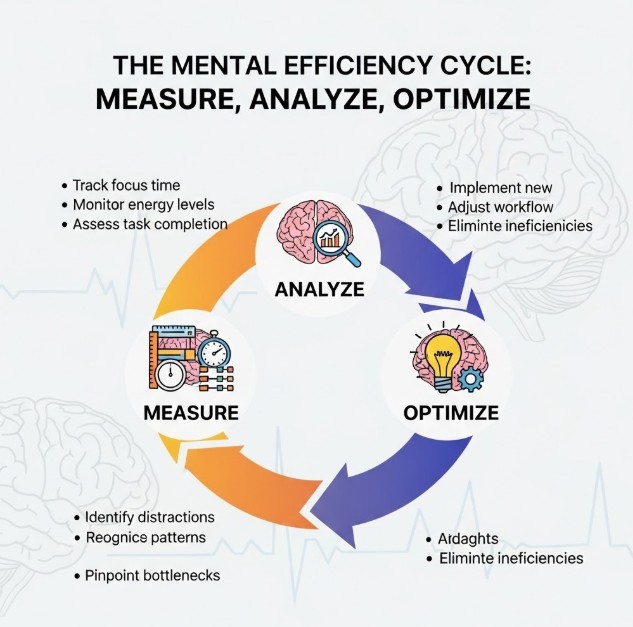
Effectiveness and Performance Analytics — Measuring and Optimizing Mental Efficiency
Table of Contents
In today’s world, most individuals are on the lookout for ways to enhance memory, improve concentration, and increase cognitive efficiency. The pressures of modern life, like information overload, endless multitasking, and pervasive stress, continue to overload our thinking.
These challenges do not just require mind training, but also testing how well it works. Just as firms use performance analytics to evaluate and improve their result, so too can individuals do the same to monitor and improve their mental performance.
Central to this process is the idea of effectiveness: the brain’s ability to generate desired outcomes, from learning and remembering to recalling at high speed when required.
What is Effectiveness?

The effectiveness of mental performance is an assessment of how effectively your mind accomplishes things in regard to learning, remembering, and applying information daily. It’s not always a matter of how hard you work, but sometimes about outcome—whether the tactics you employ measure up to quicker recall, more complete comprehension, and better problem solving.
For example, effectiveness determines whether the student’s favorite memory strategy results in faster learning and longer retention, or if it simply wastes time with no obvious enhancement.
Definition and Importance
Definition: Effectiveness in cognitive science is the degree to which mental strategies, lifestyle, or training routines result in beneficial effects in cognition and memory.
Its applicability can never be overstressed. It determines how students overcome tough topics, how working professionals remain on track under pressure, and how lifelong learners advance mentally.
It also tends to enhance mental well-being, as making meaningful progress has the potential to reduce frustration, enhance motivation, and raise self-confidence.
Effectiveness vs. Efficiency — Clear Distinctions

Although often confused with one another, effectiveness and efficiency relate to distinct dimensions of performance.
Effectiveness is doing the right things to have the desired impact, for instance, selecting aids to memory that actually enhance recall.
Efficiency, on the other hand, concerns minimizing wasted effort, such as learning a recall method in briefer, more focused practice sessions.
Both are critical to measuring mental performance. Without effectiveness, a successful effort can still fail to reach the goal. Without efficiency, successful approaches may take too much wasted time and effort.
This is why the acceptance of focus metrics, including quality and speed, can be enlightening about cognitive development.
Modern techniques, such as games to improve working memory, illustrate where effectiveness and efficiency converge. Training of this kind not only improves attention and memory but also provides measurable feedback, whether the change is real or a placebo.
Through combining applied methods and systematic observation, individuals can make their cognitive effort lead to productive, sustainable change.
Synonyms for Effectiveness and When to Use Them
Language decides what we think of performance, and sometimes the right word can highlight a slightly different angle. Even though “effectiveness” is a common word, there are instances when a quest to find an effectiveness synonym has a sharper nuance based on context. Using the right word promises clarity, precision, and impact.
Business and Productivity Contexts
In professional contexts, say in the workplace, synonyms such as success, efficacy, or impact are more appropriate. Describing a marketing approach in terms of impact, say, is articulated more convincingly than “effectiveness.” Similarly, managers would use efficacy to determine whether a prospective new system is effective. All effectiveness synonyms used here are about tangible outcomes that impact revenue, efficiency, or overall productivity.
Academic and Research Contexts
Validity, utility, or outcome quality are typical synonyms in academic writing. The utility of a technique in producing credible results can be used, while the validity of an experiment in drawing proper conclusions can be invoked. These terms evoke strictness, objectivity, and compliance with scholarly norms.
Personal Growth and Self-Improvement Contexts
Value, benefit, or usefulness choices are best applied to self-development. Their value within concentration exercises or memory training highlights real-world benefits over measures of an abstract quality. In this, the selection of synonyms preserves not only success, but personal significance and long-term growth.
What Is Performance Analytics?
When using the term performance analytics, everybody just equates it with business dashboards, sales figures, or operational metrics. However, it can be equally applied to the human brain. In cognitive settings, it is used to indicate systematic observation, measurement, and analysis of how the brain performs under different conditions.
Definition and Application in Cognitive Performance
Performance analytics is breaking down big things into manageable pieces that can be measured. In cognitive performance, it is about looking at how well we absorb, retain, and recall information. Just like companies monitor outcomes to refine their plan, individuals can monitor memory training and learning habits to determine what actually works.
For example, a test-ready student might contrast recall speed before and after the implementation of a new memory strategy. A classroom instructor would explore the impact on classroom engagement of multiple teaching strategies. A professional would track levels of attention multiple times a day to identify optimal performance times. In each case, applying performance analytics brings previously inaccessible thinking into tangible terms, giving structure to the pursuit of intellectual improvement.
Key Indicators of Mental Efficiency

Measurement of brain performance is a matter of selecting indicators of quality and sustainability. Among the most valued are recall from memory with accuracy, attention, retention of knowledge over time, and problem-solving flexibility. These key metrics for mental efficiency address how information is retained and utilized in productive contexts.
Another important area is measuring productivity, i.e., in psychological terms, the efficiency with which effort and time are converted into productive work. It could involve observation of how efficiently one could read a given number of pages with complete comprehension, how efficiently ideas could be linked to existing knowledge, or how firmly one could remain concentrating on study work.
Brain-training software and feedback tools yield this kind of measurement. Value isn’t in data gathering but in how it causes one to think. Through finding patterns, for example, methods that accelerate recall, learners and professionals can make precise adjustments.
Lastly, these measurements ensure mental energy is utilized properly. Rather than resorting to guesswork, individuals can employ evidence-based comprehension to hone their method. In this manner, performance analytics bridges the gap between cognitive theory goals and tangible, measurable action toward better thinking and learning.
Tools and Methods for Measuring Performance
Understanding how the mind operates begins with the use of good measures. Fortunately, there are various tools that both students and professionals can use to track their patterns of thought and make necessary adjustments.
Digital Tools and Apps
Technology offers powerful tools for monitoring and constructing mental capacities. Brain-training programs offer systematic exercises in memory, concentration, and reasoning. Some incorporate dashboards that chart improvement over time, so that one can easily view in productivity analysis which techniques deliver the most payoff.
There are programs focused exclusively on memory exercises to build concentration and problem-solving skills. Through the use of such software as a regular component of one’s routine, the user receives quantifiable feedback instead of relying on instinct. Flashcard programs on the computer, for instance, record recall accuracy, while concentration timers indicate how long attention can be maintained before attention begins to flag.
Manual Tracking Methods
Not all is quantifiable with technology. Old-fashioned hand-tracking is a good, low-budget option. Students can track time studying, rate of recall, or mood in work sessions. Jotting down small stuff—what they worked on, how much they recalled, how attention changed—is useful data.
For instance, a learner will monitor outcomes following practice of the mind palace technique and compare them to more traditional techniques of memorization. Routine patterns of note-taking that emphasize strengths and weaknesses will feed back into both areas of proficiency and those requiring improvement.
Such monitoring also evokes awareness. Notes taken spark consideration, and this increases awareness of thought habits and their effect.
Methods to Enhance Effectiveness and Mental Efficiency
Monitoring alone is not sufficient. It needs to be coupled with effective means of enhancing outcomes. By coupling evidence-based data with particular methods, individuals can continue to increase efficiency and effectiveness.
Time Management Methods
Mental performance is directly affected by time management. Systematic methods like the Pomodoro Technique avoid burnout while sustaining undivided attention.
As individuals experiment with multiple schedule models, tracking results provides them with excellent feedback. The data tells them where effort is being maximized, and it is simpler to assign challenging tasks to the best mental windows. Great time management ensures mental energy is invested where effort will be most productive.
Cognitive Training Exercises
Drills for cognitive training harden the brain much as exercise hardens the body. Memory, attention, and reasoning exercises habituate gains that, when measured systematically, can be quantified.
Knowing “What is working memory?” is vital here, for it is the basic platform for learning and problem-solving. Exercises that activate this system—memory recall exercises, sequencing tasks, or strategy games—improve retention and processing speed.
Other techniques, like the mind palace, enable individuals to retain and remember information with remarkable accuracy. Given proper practice and examination via recall drills on a regular basis, these sorts of techniques offer dramatic efficacy boosts.
Environment Optimization
Physical as well as psychological environments also play a role in cognitive outcomes. Physical environments such as light, volume, and space setup directly affect concentration.
By adjusting settings and taking measurements, individuals can see which settings provide optimal performance. Even minor adjustments, like clearing a messy desk or limiting digital scoops, can bring remarkable improvements to mental performance.
Optimizing the environment isn’t merely a matter of comfort but of quantifiable impact. Mostly paired with diligent monitoring, it discloses the conditions in which the mind works best.
When measuring mechanisms, strategic techniques, and tools come together, they create a thinking and improvement cycle.
Why Measuring and Improving Performance Matters
In a world where information hits us harder than ever, mental toughness is pivotal. Being able to remember information, pay attention, and use what you know well is what helps you do well in school, at work, and in life. However, you have to identify the appropriate tools for measuring your performance.
This is where performance analytics may help. Individuals can use proven tools and procedures that are generally employed to figure out their mental patterns, uncover their flaws, and make their strengths even stronger.
It’s not only about working hard to become better. It’s all about utilizing facts, reason, and clever plans to make sure that every unit of energy spent on learning is worth it. By making mental effectiveness a science and an art, you give yourself the tools to progress gradually, break through mental barriers, and become resistant to problems.